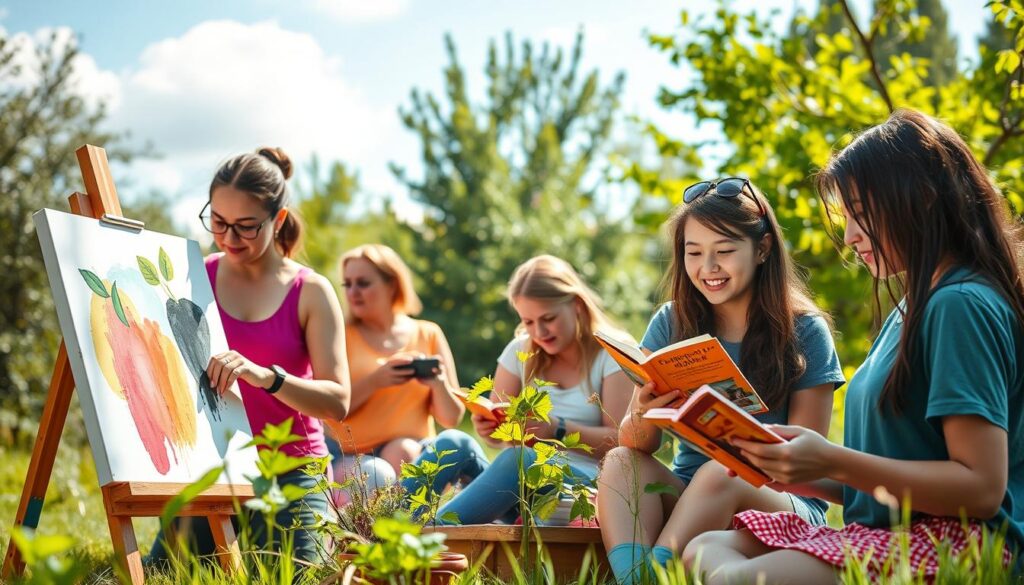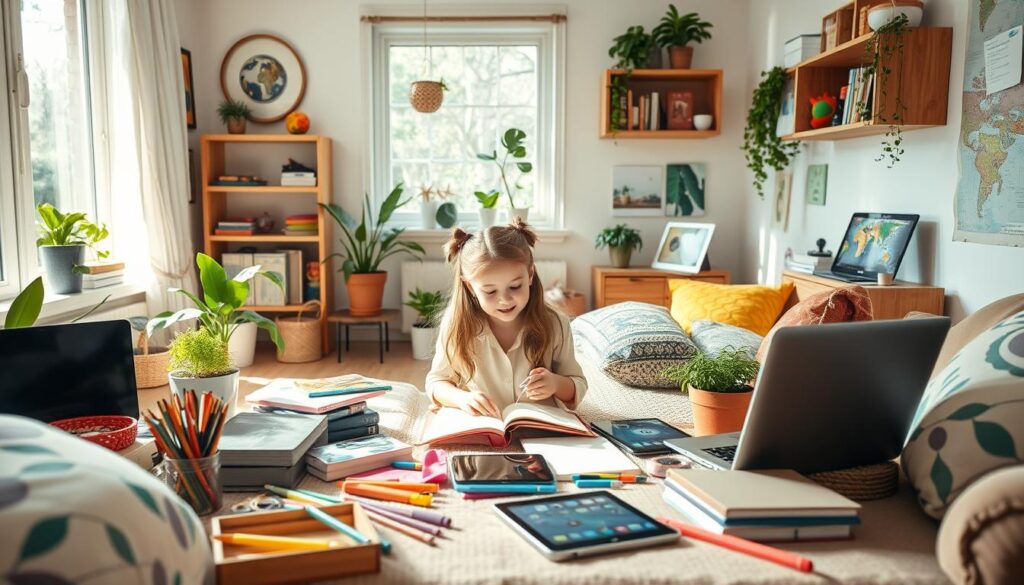Ever wondered what makes unschooling different from homeschooling? Unschooling lets kids explore their interests freely, without a set curriculum. Parents want their kids to stay free and confident, but traditional schools might limit this.
Unschooling boosts self-esteem and confidence. It focuses on learning that kids find interesting. This approach helps kids become lifelong learners, valuing their individuality and choices.
Key Takeaways
- Unschooling for beginners places a strong emphasis on freedom in learning.
- Children develop a high level of self-esteem and confidence.
- It values individuality and autonomy, encouraging children to make their own choices.
- Unschooling promotes lifelong passionate learning without traditional constraints.
- Supports the holistic development of social, emotional, and physical well-being alongside academics.
What is Unschooling?
Unschooling is a unique way to learn that breaks away from traditional school methods. It focuses on a child’s natural curiosity and desire to learn. This is different from the set curricula of traditional schools. Unschooling is chosen by those who want a more personal and interest-based education for their kids.
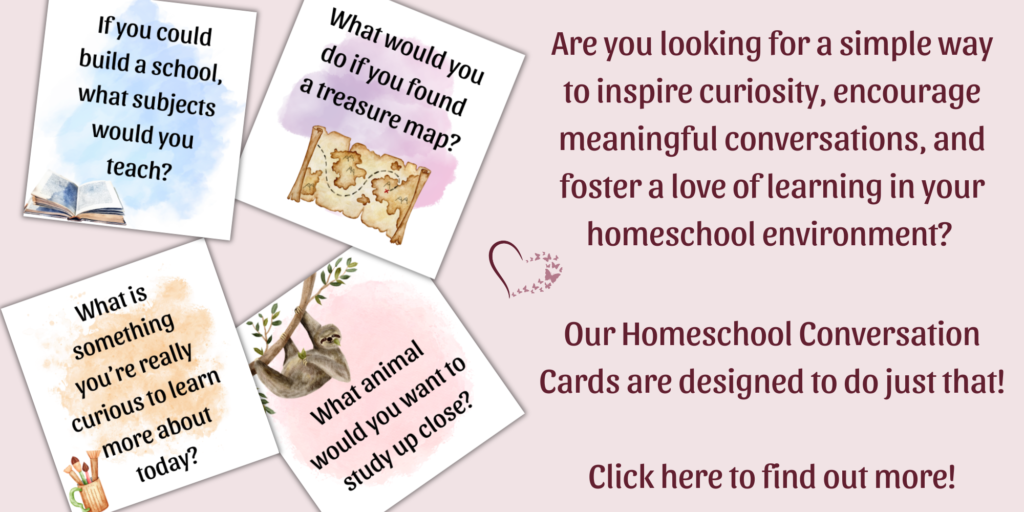
Definition and Origin of Unschooling
John Holt first came up with the term unschooling. He believed in learning through everyday experiences, not just a set curriculum. This approach lets kids explore their interests and learn naturally.
John Holt’s Vision
John Holt’s vision was to make learning free from traditional classrooms. He thought true education lets kids follow their passions and stay curious forever. His ideas helped start unschooling, offering unschooling tips for beginners to follow this path.
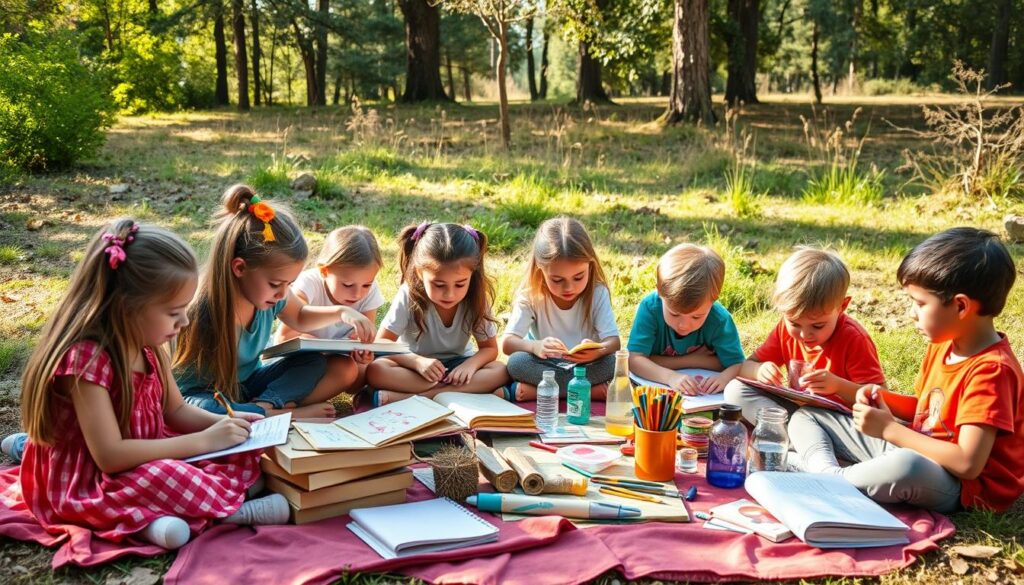
Key Differences from Traditional Schooling
Unschooling and traditional schooling are very different. Traditional schools have a set curriculum, while unschooling lets kids learn what they’re interested in. Unschooling also lets kids learn at their own pace, focusing on practical skills rather than just memorizing.
- Structure: Traditional schooling is structured and curriculum-based, while unschooling is fluid and interest-based.
- Goal-Setting: In traditional schools, educational goals are predefined, whereas, in unschooling, goals are set by the learners themselves.
- Information Transmission: Teaching in schools is typically one-way (teacher to student), but unschooling fosters interactive, two-way learning.
- Pace of Learning: Schools often follow a set pace, but unschooling adapts to the individual pace of each child, promoting a personalized learning experience.
Unschooling aims to prepare kids for a changing world by teaching them to adapt and love learning. It follows Holt’s idea that education should be a part of life, not just school.
Benefits of Unschooling
Unschooling is becoming more popular in the U.S. It focuses on child-led learning. This approach helps kids develop a love for learning.
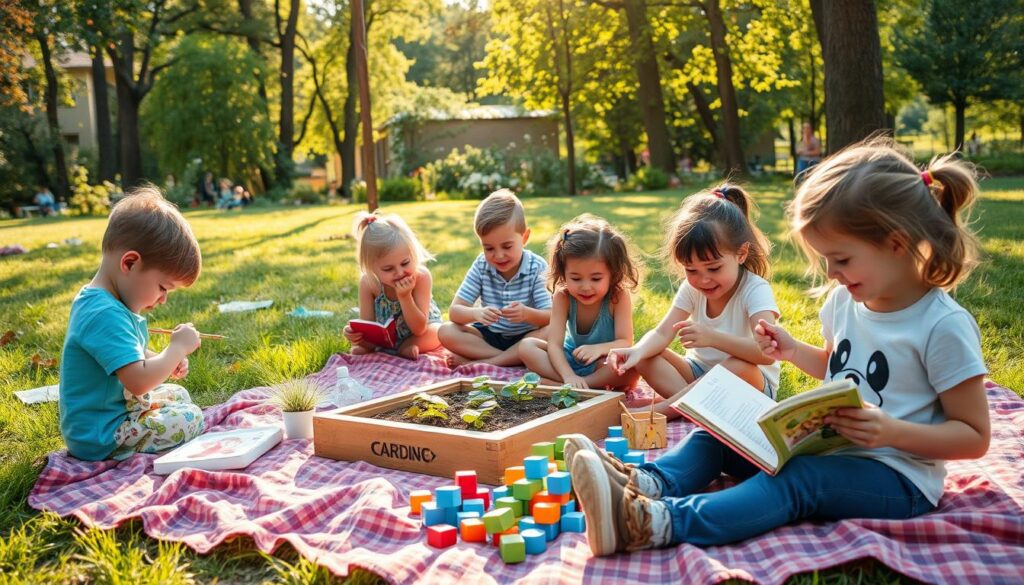
Fostering Confidence and Autonomy
Unschooling helps kids feel more in control of their learning. This boosts their confidence and independence. Experts say it helps kids manage their feelings and stay motivated.
By letting kids choose what they learn, unschooling builds their self-confidence. It also teaches them to take responsibility for their education.
Encouraging Delight-Driven Learning
Unschooling makes learning fun by focusing on what kids love. This approach lets kids dive deep into their interests. It’s all about exploring and learning at their own pace.
This way of learning keeps kids excited about learning. It lets them discover new things without the stress of a strict schedule. This helps them grow intellectually for their whole lives.
| Aspect | Benefits |
|---|---|
| Confidence and Autonomy | Children become self-assured and independent; manage emotions better. |
| Delight-Driven Learning | Children explore areas of genuine interest; develop a deep passion for learning. |
| Flexibility | Allows learning at any time; accommodates spontaneous interests. |
| Lifelong Learning | Promotes continuous growth beyond formal education. |
| Enjoyment | Learning becomes a fun and engaging process. |
How to Start Unschooling
Starting your unschooling journey means changing how you see learning. Parents need to look back at their own school days and let go of old ideas. We’ll cover the basics of starting unschooling, including setting up a learning space and finding useful tools.

Steps for Parents
The first step is to take a deschooling period. This lets both kids and parents get used to not being in school. It’s important to be patient and trust that kids can learn by themselves. Joining local unschooling groups can also help a lot.
Setting Up a Learning Environment
Creating a good learning space is key for unschooling. It should be open and inviting, unlike a traditional classroom. Fill your home with books, games, art, and music. Don’t forget about outdoor learning, where kids can explore nature.
Tools and Resources
Unschooling doesn’t follow a set curriculum, so kids can follow their interests. Use online learning tools, books, and other resources to help them learn. Kerry McDonald’s “Unschooled” and Rachel Rainbolt’s “Sage Homeschooling” are great books to start with.
| Resources | Examples |
|---|---|
| Books | “Unschooled” by Kerry McDonald, “Sage Homeschooling” by Rachel Rainbolt |
| Online Platforms | Coursera, Khan Academy |
| Groups | Local unschooling and homeschooling groups |
| Outdoor Activities | Nature walks, gardening |
The Role of Parents in Unschooling
Exploring unschooling basics shows parents are key. They guide by letting kids explore and use resources that spark their interests. This approach makes parents more like guides than teachers.
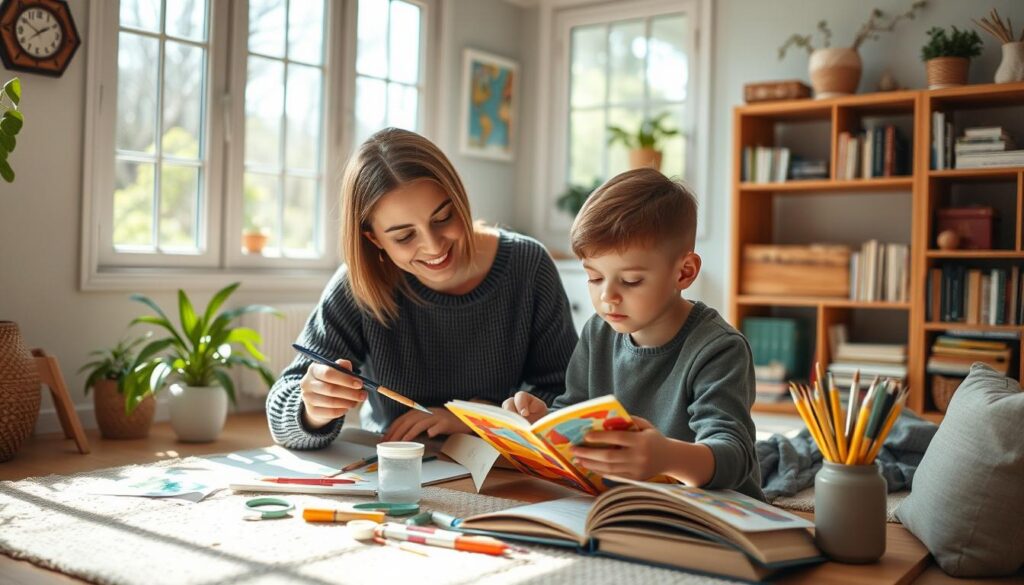
Parents in unschooling spend more time with their kids than teachers do. This closeness helps them see how their child is doing without the usual classroom distractions. So, parents can really help their child learn without extra work.
Watching their child is a big part of unschooling. Parents see how their child grows every day, without the need for tests. This way, they trust that kids will learn naturally, just like they did when they first walked.
Unschooling celebrates the child’s autonomy, allowing them the freedom to learn what and how they want, thereby fostering individualized and creative learning methods.
Being a parent in unschooling means more than just helping. It’s about supporting and loving your child as they learn. Parents help kids find answers and talk about important topics like ethics and kindness. This way, learning is personal and meaningful.
Unschooling parents are flexible and creative. They help break down old-school learning doubts. They see themselves as partners in their child’s learning, creating a space where learning is fun and focused on what interests them.
Delight-Driven Learning
Unschooling focuses on letting kids follow their passions. This makes learning fun and exciting. It helps kids become independent and in charge of their learning.
Parents play a big role by supporting their child’s interests. This creates a world full of learning opportunities for unschooled kids.
Identifying and Nurturing Interests
Finding out what a child loves is the first step. Parents can watch what they do every day and ask questions. This helps figure out what they’re really interested in.
Once you know, you can help them learn more. For example, you can:
- Books and Online Resources: Give them books and online stuff that matches their interests.
- Workshops and Classes: Sign them up for classes or workshops that they’ll enjoy.
- Real-World Experiences: Plan trips or hands-on activities that match their interests.
This way, kids can dive deep into what they love. They’ll learn a lot and get better at it.
Creating Opportunities for Exploration
It’s important to give kids room to explore. They need a mix of structure and freedom. Delight-driven learning has a few core subjects and lots of free time for exploring.
- Hands-On Projects: Encourage projects that make them think and solve problems.
- Wide Reading: Get them to read a lot on different topics to learn more.
- Personalized Learning Plans: Make a plan that fits their interests and what they can do.
This way, kids can really explore and learn. They’ll remember more and stay excited about learning.

Remember, it takes time for kids to adjust to learning in a new way. But, with patience, they can develop a lifelong love for learning.
In short, unschooling through delight-driven learning is great. It helps kids find what they love and explore it. This sets them up for a successful and happy learning journey.
Unschooling vs Homeschooling
When we talk about unschooling vs homeschooling, it’s key to know the big differences. Both unschooling and homeschooling mean learning outside of school. But they go about it in very different ways.
Key Differences
The main key difference is the curriculum. Homeschooling uses a set plan with textbooks and tests. On the other hand, unschooling lets kids learn what they want, when they want.
Homeschooling might get less strict over time. But unschooling always focuses on spontaneity and real-life learning. This approach helps kids love learning for life.
Pros and Cons
It’s important to know the pros and cons of each choice for parents.
| Aspect | Unschooling | Homeschooling |
|---|---|---|
| Learning Approach | Child-led, interest-driven | Parent-led, curriculum-based |
| Structure | Flexible, fluid schedule | Structured with set routines |
| Assessment | No formal tests or grades | Regular assessments |
| Stress Levels | Generally lower stress | Potentially higher stress due to curriculum demands |
| Focus | Life skills and natural curiosity | Academic rigor and comprehensive coverage of subjects |
| Parental Role | Facilitator and observer | Instructor and evaluator |
Both aim to give a personalized education. Unschooling focuses on teamwork between child and parent. This can make learning less stressful. Homeschooling might offer more predictable results because of its structure.
In short, the choice between unschooling vs homeschooling depends on what you value most. Each method has its own benefits. They can help meet the needs of both kids and parents, aiming for a rewarding educational journey.
Addressing Common Concerns
When we talk about unschooling, people often worry about a few things. They might think it’s not rigorous enough, that kids won’t be ready for adulthood, or that it doesn’t follow state laws. Let’s look at how unschooling tackles these concerns.
First, about academic rigor, studies show unschooled kids often do great in school. They get to explore topics they love deeply. Kids ask a lot of questions, and when they get answers, they learn even more.
Next, about being ready for adulthood, unschoolers often grow up to be self-motivated and well-rounded. They learn to manage their time and take responsibility for their learning. The Finnish education system, starting at age seven, shows that you can do well without standardized tests.
Finally, about state laws, many unschooled kids meet or beat these standards without a traditional curriculum. Our family did a mix of activities, from Free Forest School to dance classes. When we checked the state kindergarten standards, our kids were right on track.
Unschooling also focuses on life skills, not just academics. It strengthens family bonds and values relationships. In our family, we spent lots of time outdoors, reading, and doing things with our unschooling group. These moments helped us connect and understand each other better.
Socialization, Structure, and Discipline
Unschooling raises questions about socialization. Unlike traditional schools, unschooling lets kids mix with people of all ages. This helps them develop important social skills and make meaningful connections outside school.
The Fraser Report from 2007 and 2015 shows that unschooling can help kids grow socially. It’s a different way of learning that works well.
Dealing with Socialization Questions
Parents often worry about their kids missing out on social experiences. But unschooling can actually lead to better social interactions. Kids meet people of different ages and backgrounds.
Research in Canada shows that 10% of homeschooling families unschool. Their kids are happy and do well socially.
Maintaining Structure Without Coercion
Structure in unschooling doesn’t mean strict schedules. It’s about creating a learning space that changes with a child’s interests. This way, kids learn at their own pace.
Places like Summerhill School in England and Sudbury Valley schools in the US show how it works. They offer a flexible yet structured learning environment.
Fostering Self-Discipline
Unschooling focuses on self-discipline through genuine interest, not rules. Kids learn to manage their time and interests. This is different from traditional schools that focus on following rules.
Studies show that kids can grow a lot when they learn on their own. The author’s own experience shows that self-study can lead to better grades.
Unschooling has shown promising results. Most studies focus on traditional schools, but unschooling research is growing. Reports like The Fraser Report show its benefits.
Fostering self-discipline in the context of unschooling can be a transformative journey for both learners and facilitators. Unlike traditional education systems with age-segregated classes and rigid schedules, unschooling promotes a flexible, interest-led structure that places the learner’s interests at the forefront. This approach encourages children to explore their passions and take charge of their own learning, thus nurturing intrinsic self-discipline. The process of getting started with unschooling hinges on providing a supportive environment where children can thrive through self-directed learning, allowing them to develop motivation and focus based on their unique interests.
| Traditional Schooling | Unschooling |
|---|---|
| Age-segregated classes | Mixed-age socialization |
| Rigid schedules | Flexible, interest-led structure |
| External discipline | Intrinsic self-discipline |
| Teacher-directed learning | Self-directed learning |
Central to the unschooling philosophy is the recognition that mixed-age socialization is vital for a child’s development. In traditional settings, students are often confined to their age groups, which can limit their exposure to diverse perspectives and learning styles. Unschooling facilitates interactions among children of all ages, enhancing social skills and emotional intelligence. This organic, community-driven approach encourages learners to engage collaboratively, fostering a sense of responsibility and accountability as they navigate their educational paths. As children share their knowledge and learn from one another, they inherently develop the discipline needed to respect and appreciate different viewpoints.
Moreover, transitioning from teacher-directed learning to self-directed learning cultivates a sense of ownership over one’s education. In a world dominated by external discipline, where learners often rely on grades or external validation, unschooling liberates kids from these constraints. Instead of working for a teacher’s approval, children in an unschooling environment are empowered to set their own goals and deadlines. This shift not only assists them in building self-discipline but also encourages resilience as they tackle challenges independently, finding solutions through curiosity and trial and error.
Ultimately, the essence of fostering self-discipline in unschooling lies in creating an environment that champions creativity and exploration over conformity and restriction. By embracing unschooling basics for beginners, families can embark on a rewarding journey that prioritizes a child’s natural learning processes. As learners grow in this nurturing space, they cultivate lifelong skills that extend far beyond academic achievements, imbuing them with the self-discipline essential for navigating life’s complexities with confidence.
Community Involvement
Being part of a community is key in unschooling. It offers support and a chance to socialize. Kids join local groups, attend classes, and travel, meeting peers along the way.
Parents play a big role by being active, answering questions, and building trust. These communities share resources and grow together. One family suggested finding a supportive community, online or with friends, to support unschooling.
| Suggestion | Impact |
|---|---|
| Letting children explore interests freely | Develops autonomy and deep expertise |
| Engaging in affordable activities | Encourages creativity and resourcefulness |
| Participating in a supportive community | Fosters social engagement and collaboration |
| Honesty and protection in family dynamics | Builds trust and a loving environment |
The variety in unschooling shows its flexibility and adaptability. These examples and community involvement create a thriving environment for unschooled kids to grow.
Unschooling Resources for Beginners
Starting an unschooling journey can be both exciting and a bit scary. Luckily, there are many unschooling resources for beginners to help. You can find books, websites, support groups, and online courses. These tools are here to help both parents and kids.
Books and Websites
Books and websites are great for learning about unschooling. They offer tips for everyday learning.
- Books: “How Children Learn” by John Holt, “The Unschooling Handbook: How to Use the Whole World as Your Child’s Classroom” by Mary Griffith, “Free to Learn” by Peter Gray
- Websites: Stories of an Unschooling Family, Joyfully Rejoycing, Sandra Dodd, The Educating Parent, Laura Grace Weldon
About 70% of unschooling resources are blogs and websites. They share insights from experienced unschoolers. Parents can find lots of useful information here.
Support Groups and Communities
Joining supportive unschooling communities is very helpful. You can share ideas, experiences, and get advice from others.
- Online Communities: Facebook groups dedicated to unschooling, Reddit threads, and local Meetup groups focused on unschooling
- Podcasts: Stories of an Unschooling Family, Exploring Unschooling, The Unschooling Life, Fare of the Free Child, Off Trail Learning
Support groups and communities offer emotional support and access to unschooling learning materials. Podcasts, making up 20% of resources, offer valuable perspectives and encouragement.
Online Courses and Webinars
Online courses and webinars provide structured learning. Websites like Outschool offer live classes. Students can interact with teachers and peers in real time. Platforms like Skillshare and Khan Academy also offer valuable courses.
- Art Classes: Masterpiece Society, Aquila Magazine
- Language Learning: Duolingo
- Science Resources: Generation Genius, Mel Science
- Planning Tools: Mulberry Planner
These structured resources make up 30% of unschooling resources. They ensure that unschooling learning materials are both comprehensive and engaging.
Conclusion
Unschooling is a big change from traditional schools. It puts a child’s freedom and interests first. We’ve looked into how unschooling can change education for the better.
From John Holt’s ideas to how to start unschooling, we’ve covered a lot. A 2011 study showed how unschooling works and its benefits. It also talked about the challenges.
Unschooling families do things their own way. They might let the child lead or take a more relaxed approach. The study found that unschooling helps kids think creatively and solve problems.
Stories from unschooling families show how it works in real life. They do things like fix up their homes or help out in the community. These stories show that unschooling makes learning fun and free from strict rules.
Looking ahead, unschooling could make education better for everyone. It lets kids learn in a way that fits them best. This approach could really help kids grow and learn in a unique way.
FAQ
What is unschooling?
Who pioneered the concept of unschooling?
How does unschooling differ from traditional schooling?
What are the benefits of unschooling?
How can we start unschooling our child?
What role do parents play in unschooling?
How do we identify and nurture our child’s interests?
What are the key differences between unschooling and homeschooling?
What are common concerns about unschooling and how are they addressed?
How is socialization handled in unschooling?
What are some real-life success stories of unschooling?
What resources are available for beginners in unschooling?
Source Links
- Confidence and Self-Esteem: How Unschooling Empowers Children – Happiness is here – https://happinessishereblog.com/confidence-and-self-esteem-how-unschooling-empowers-children/
- Introduction to Unschooling: A Beginner’s Guide – N8 Education – https://n8edu.com/introduction-to-unschooling-a-beginners-guide/
- Unschooling: Laws & How to Start – https://www.time4learning.com/homeschooling-styles/unschooling.html
- The Beginner’s Guide to Unschooling – zen habits – https://zenhabits.net/unschool/
- Would Unschooling Actually Make My Kids Any Happier? – https://www.thecut.com/2022/11/unschooling-benefits-disadvantages.html
- Benefits of Unschooling – a personal experience – https://learningthis.life/benefits-of-unschooling-a-personal-experience/
- Unschooling – The Best Guide for Parents | Otsimo – https://otsimo.com/en/unschooling-guide/
- I Want To Start Unschooling Where Do I S | BarefootChild – https://www.barefootchild.info/about-1-1
- The Role of an Unschooling Parent – https://thegreenparent.co.uk/featured/the-role-of-an-unschooling-parent/
- What’s a parent’s role in unschooling? – Penelope Trunk Education – https://education.penelopetrunk.com/2014/06/27/whats-a-parents-role-in-unschooling/
- How to refresh your homeschool with Delight Directed Learning – https://thedelightfulhomeschool.com/?page_id=787
- What Is Delight-directed Learning – https://www.benandme.com/delight-directed-learning-what-is-it/
- How We Unschool – Rachael Alsbury – https://www.rachaelalsbury.com/2021/06/21/how-we-unschool/
- How is unschooling different from homeschooling? – https://westriveracademy.com/en/how-is-unschooling-different-from-homeschooling/
- Unschooling Vs. Homeschooling: How are they different? – https://www.thehomeschoolgraduate.com/unschooling/
- Why It’s OK for Children to Have Gaps in Their Education (Unschooled or Not) – Raised Good – https://raisedgood.com/gaps-education-unschooled-or-not/
- What is Unschooling? The Ultimate Guide to Unschooling – https://happinessishereblog.com/what-is-unschooling/
- How we unschooled kindergarten – https://raisingwildflowerkids.com/2018/07/13/how-we-unschooled-kindergarten/
- The Unschooling Revolution: Taking Education Into Our Own Hands – https://www.simplemindfulness.com/the-unschooling-revolution/
- Unschooling FAQ – https://unschoolingtouniversity.com/unschooling-faq/
- Beginning Unschooling: Some ideas – https://sandradodd.com/beginning
- An In-Real-Life Look at Unschooling – https://hiphomeschoolmoms.com/real-life-look-unschooling/
- Unschooling: What Does it Look Like? – https://giftedissues.davidsongifted.org/bb/ubbthreads.php/ubb/printthread/Board/5/main/14898/type/thread.html
- My BIG Page of Unschooling Resources – https://www.storiesofanunschoolingfamily.com/my-big-page-of-unschooling-resources/
- Unschooling Resources for 2023 – Happiness is here – https://happinessishereblog.com/unschooling-resources-for-2023/
- Our Unschooling Resources for 2021 – Happiness is here – https://happinessishereblog.com/our-unschooling-resources-for-2021/
- The Challenges and Benefits of Unschooling, Here We Go – https://medium.com/exploring-wisdom-unschooling-and-world-schooling/the-challenges-and-benefits-of-unschooling-here-we-go-6cb2d33a9d2f
- An Introduction to Unschooling – Modify – https://modifyedu.com/an-introduction-to-unschooling/
- Why I Concluded That Unschooling Doesn’t Work (When It Does) – https://www.storiesofanunschoolingfamily.com/why-i-concluded-that-unschooling-doesnt-work-when-it-does/

